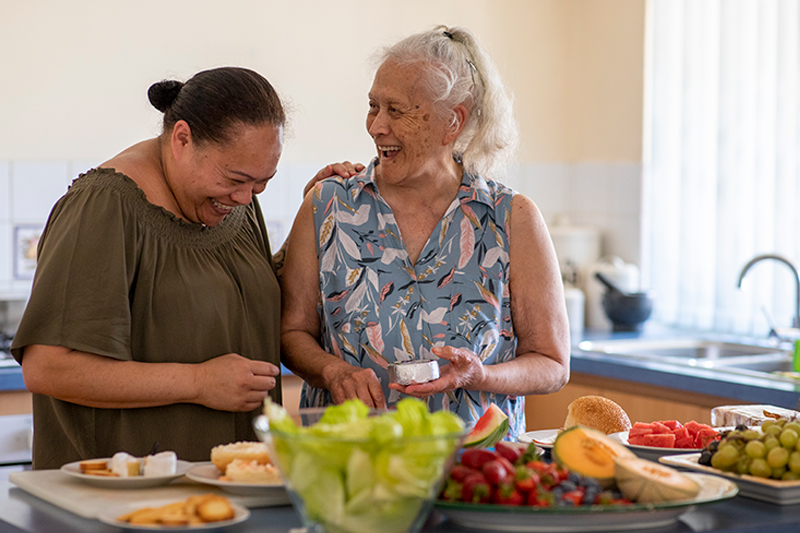
3 Ideas for Creative Alzheimer’s Activities Utilizing Food If there’s one thing that connects us all, it’s food! Think about how many precious memories have been made over the years that included food at the center of them all: holiday meals, birthday parties, wedding celebrations. Even ordinary days involve routines that become ingrained in us around food, from that first aromatic cup of coffee in the morning to a shared bowl of buttery popcorn with family while watching a show on the television. It’s only natural that some of the most effective and creative Alzheimer’s activities are centered on food. Food-related activities are a great way to connect with someone with dementia, while engaging all of the senses. Here are some activities you can try to help spark memories and create new ones. Decorating. Frost cupcakes while reminiscing about the treats Mom would prepare for school birthday parties. Roll out cookie dough and use cookie cutters and sprinkles to make them specific to an upcoming holiday as you discuss holidays past. Preparing.…

Downsizing and Dementia: Follow These Guidelines for a Smoother Transition You’ve decided the family home is just too much for your parents to manage. A small house is for sale just down the road from you that is ideal: a beautiful flower garden in the front yard, a bright, cheerful kitchen, and no stairs to navigate. Now it’s time to start the downsizing process. The only problem? Mom has dementia. And while the combination of downsizing and dementia isn’t easy to navigate, there are steps you can take to help. Change for a loved one with dementia can be extremely challenging. Leaving the familiarity of home and moving into a brand new one can enhance feelings of agitation and anxiety. Try these approaches to help ease the transition. Go slow. You may be inclined to make the process as quick as possible – like tearing off a Band-Aid. However, a better approach in this situation is taking time to discuss the upcoming changes with the senior, one step at a time. Keep a calm and consistent demeanor, and empower the person to maintain as much control…

What You Can Expect in the Last Stage of Alzheimer’s The journey through Alzheimer’s can take years, with stops and starts, twists and turns, and plenty of unknowns. As the caregiver for someone with dementia, it’s important to know what may be coming around the next bend so that you can be prepared and provide the most appropriate level of care. While each person experiences Alzheimer’s uniquely, there are some commonalities to each stage. Here's what you may find in a senior who enters the last stage of Alzheimer’s disease: Challenges with eating and swallowing Difficulty walking or no longer able to walk An increased vulnerability to illnesses The need for full-time care and support The best way to support the senior is through preserving dignity and improving quality of life. Think of ways to engage the person’s senses that are meaningful and personal, such as by: Listening to favorite music together Reading aloud Looking through photo albums Preparing the person’s favorite foods Applying lotion with a pleasant scent…

Here’s Why Alzheimer’s Caregivers Really Need Support “You can make it, but it’s easier if you don’t have to do it alone.” – Betty Ford We all know that no one person is an island, something that especially rings true for Alzheimer’s caregivers. Nevertheless many family caregivers falter with regards to accepting or asking for the help they need. Because of this, stress is exacerbated, as there is little if any time for self-care – an important feature for anybody in a caregiving role. Why are we often so resolved to address such an extraordinary undertaking independently? Here are a number of common reasons and why we should rethink them: No one else could care for Mom like I will. While you are most certainly not replaceable, the purpose of enlisting help is not replacement, but respite. An older adult with Alzheimer's can benefit from the socialization provided by someone aside from yourself, while you gain the benefit of a much-needed break – ultimately allowing you to provide better care to the senior when you return.…

How to Improve Life with Dementia Through Reminiscence Therapy Memory loss and Alzheimer's may seem synonymous. However, it is important to realize that long-term memory frequently remains intact long into the progression of the disease. So if you’re wondering how to improve life with dementia, tapping into those distant memories is a perfect way to foster engagement in current conversations by connecting to the past. Known as reminiscence therapy, these walks down memory lane help older adults: Better connect to others through sharing stories Decrease stress and negative emotions by shifting the focus to happier times Minimize some of the adverse effects of Alzheimer's, such as restlessness, wandering, anger, and more Instill self-confidence by bringing to mind the countless accomplishments they’ve made in addition to lives they have impacted Implementing reminiscence therapy doesn’t have to be elaborate. Start with opening a photo album and simply looking at photographs together. Let the person drive the next steps. If a certain photograph…

How to Understand and Prevent Delirium in Seniors Although dementia is often the culprit behind the confusion, forgetfulness, and disorientation experienced by older adults, there’s another condition to be mindful of. It is widely prevalent, causes similar symptoms, and most importantly, is curable: delirium. As a matter of fact, as many as ¾ of seniors experience delirium after a surgical procedure or infection, and proper diagnosis is critical to ensure correct treatment. And not only that – there are steps that can be taken to prevent delirium in seniors as well. One of the largest differentiators in delirium is its rapid onset, and its propensity to produce symptoms that come and go throughout the day, compared to dementia’s slow, steady, ongoing and rather predictable decline. For example, a senior with delirium may struggle to recognize or recall the name of a family member or friend, get confused in their surroundings, hallucinate, or have problems with communicating – but later in the day, fully recover functionality…




















